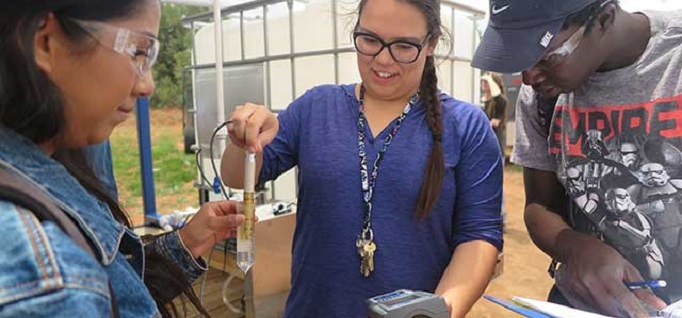Preparing next-gen Navajo water scientists
By Rosemary Brandt
June 10, 2021
Students at an Arizona college will get the opportunity to solve emerging water challenges in their communities
Diné College and the University of Arizona are working together to train the next generation of Navajo water scientists.
With the help of a $500,000 grant from the U.S. Department of Agriculture’s National Institute of Food & Agriculture through the Tribal College Research Grant Program, Navajo youth will receive technical and hands-on experience in microbiology, molecular biology, chemical and microbial water analysis and pressure-driven membrane processes. Students at Diné College – a public tribal college in northern Arizona – also will learn about traditional and advanced water and wastewater treatment procedures.
“Water scarcity is increasing day by day, and we need our own Navajo water scientists who understand the traditional values associated with water and its importance. For Navajos, water is life. Water is used for a number of ceremonial purposes,” said Shazia Tabassum Hakim, principal investigator on the grant and a professor of microbiology and biomedical sciences in the Diné College School of Science, Technology, Engineering, & Math. “We want our students to see all aspects of water treatment and management and use them according to their own culture, own traditions and own needs.”
“The Navajo Nation is the largest Native American tribe, with more than 20,000 households with no access to public infrastructure in terms of running water and electricity,” said Vasiliki Karanikola, UArizona’s principal investigator on the project and an assistant professor of chemical and environmental engineering. “Providing STEM tools and opportunities to Native American college students to understand and solve emerging water challenges is very important, as it creates a new generation of scientists and engineers ready to address water challenges within their own communities.”
Intense research for innovative solutions
Each year, six Diné College juniors will be trained through a 10-week internship, and two seniors will be given the opportunity to work alongside Hakim as research assistants. The first cohort will begin virtually this fall, with plans to provide in-person opportunities at both land-grant institutions in the program’s second and third year.
The goal of the internship program is to provide the skills, knowledge and experiences necessary to prepare student interns and research assistants for STEM career paths. The skills provided will extend beyond those acquired directly through classroom experiences, Hakim said.
Through the three-year program, a multidisciplinary research team of experts from both land-grant institutions will focus on issues of water sustainability, particularly potential reuse applications for polished effluent, which is wastewater that’s gone through its final treatment stage, said Benita Litson, Diné College land-grant director and co-investigator on the project.
The research team will identify and address the possible presence of microbial and chemical contaminants in treated wastewater, the use of pressure-driven membrane filtration systems to polish effluent before reuse, and potential technical impediments to agricultural use of polished effluent.
“Arizona is in a long-term drought, and water resources will continue to decline. It is imperative that innovative ways of water recycling and conservation be explored,” said Karletta Chief, co-principal investigator on the grant and a professor of environmental science in the UArizona College of Agriculture and Life Sciences.
As a means of preserving scarce freshwater resources, treated wastewater can be used to create green spaces, restore arid ecological systems, suppress wildfires and support agriculture.
“Our treated wastewater effluent is usually discarded at open streams and rivers or reloaded into aquifers. Water reuse takes that wastewater effluent and further treats it with advanced water treatment processes and produces pristine water that can be used for many applications,” Karanikola said. “Whether we reuse the water directly or use it for agricultural purposes, it will be a big win in supporting the survival of the Southwest during severe droughts.”
“In Navajo culture, water has integral value in day-to-day life. Hence, this study will be conducted as a baseline research project with a focus on training our students to help support the best interests of the Navajo Nation,” Hakim said. “At the same time, our results will be available to communities outside the reservation for guidance and utilization.”
Learn more about the project here.



